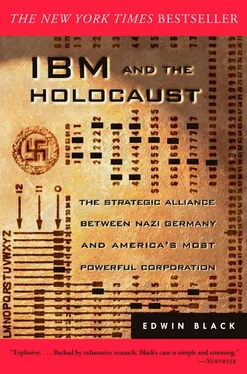More than just hot meals and baked goods, Watson wanted to make sure Dehomag was successful and effective. He personally dispatched Eugene Hartley, a top IBM census expert and manager of the firm’s statistical department, to advise Dehomag. Hartley would oversee costs in Berlin and become acquainted with all details of Dehomag’s census operation and its methods. These details were to be recorded in a special handbook. No copies would exist. Senior management at Dehomag sent Watson an RCA Radiogram declaring, “We especially appreciate your foresight in sending Mister Hartley who as a census expert is especially helpful to us at a time when we are undertaking greatest service job ever done by any IBM agency.” 37
Most gratifying to the Germans was the secret pact between Watson and Heidinger, entered into that October 1933, while Watson was touring Dehomag. At a time when the Hitler government was declaring its war intentions in Europe, Watson’s secret deal granted Heidinger and Dehomag special commercial powers outside of Germany. Although there were IBM agencies and subsidiaries throughout Europe, Dehomag would be permitted to circumvent and supplant each one, soliciting and delivering punch card solution technology directly to IBM customers in those territories. That gave Dehomag entree to the major foreign corporations, foreign national railroads, and foreign government offices across the Continent. IBM subsidiaries, such as those in Brussels, Paris, and Warsaw would still exist. But now Nazified Dehomag could usurp their clients and even their manufacturing base. 38
The extraordinary arrangement virtually reinvented Dehomag as a de facto “IBM Europe.” Subject to IBM NY oversight, the German subsidiary was granted free rein to cultivate its special brand of statistical services to other nearby countries, especially Austria, Czechoslovakia, Poland, Belgium, France, and Holland. Where census, registration, and other statistical operations did not exist, or where they could be updated along the lines of Germany’s anti-Semitic model, Dehomag could now move in. In essence, before the Third Reich advanced across any border, its scientific soldiers would already have a vital outpost.
With its new potency to create a German sphere of statistical influence across the continent, no wonder senior management in November 1933 sent Watson a jointly signed cable proclaiming, “Your visit to Germany has brought encouragement not only to Dehomag, but to the German people.” 39
* * *
CONSIDERING THEconsidering the far-reaching importance of the Watson-Heidinger agreement for commercial hegemony, and the certainty of upsetting other IBM subsidiaries, Watson committed nothing to paper about his secret territorial agreement with Heidinger. Deniability seemed to be the order of the day.
Clearly, Watson possessed an understanding of the value of deniability. When he was prosecuted for criminal conspiracy in the National Cash Register case, he was confronted by exhibit after exhibit of his own incriminating writings, such as instructions to destroy competitors and create fake companies. That error would not happen again. Moreover, IBM was at that very moment being prosecuted by the U.S. Justice Department’s anti-trust division for additional secretive acts of monopoly and unfair competition involving punch card technology. 40
Watson developed an extraordinary ability to write reserved and cleverly cautious letters. More commonly, he remained silent and let subordinates and managers do the writing for him. But they too respected an IBM code—unwritten, of course—to observe as much discretion as possible in memos and correspondence. This was especially so in the case of corresponding with or about Nazi Germany, the most controversial business partner of the day.
For example, a few weeks after Watson left Germany, one of IBM’s European managers in Paris, M. G. Connally, was assigned to monitor details of the merger of IBM’s four subsidiaries. On November 18, 1933, Connally wrote a letter to Heidinger concluding with the sentiment: “I only wish we had someone here to do things the way you people do in Germany.” Shortly thereafter, Connally circulated a copy of that letter to Watson and other executives at IBM NY. Connally sheepishly scribbled under the last sentence, “I think now I shouldn’t have said this.” 41
Whether or not Watson wanted to keep the Dehomag expansion deal a secret, Heidinger was clearly irked by the absence of any proof that he could literally invade any other subsidiary’s territory. Census offices and other IBM customers in other countries would be surprised if abruptly contacted by a Dehomag agent. And any IBM subsidiary manager would surely challenge a Dehomag attempt to steal its business.
After many months of waiting, Heidinger suddenly demanded some written proof.
On August 27, 1934, he pointedly cabled Watson, “We need urgently by cable and following letter confirmation for our right granted by you personally to deliver our German manufactured machines for entire European market…. This right does not include any obligation of your European companies to give any orders.” 42
Watson gave in. The next day, August 28, he dispatched a radiogram to Berlin: “Confirming agreement reached between us last conference in Berlin. We extend German company rights to manufacture machines under our patents for all European countries. Formal contract following by mail. Thomas Watson.” 43
But the contract that followed by mail was not acceptable to the Germans. Heidinger detested negotiating with Watson and bitterly remembered how he had lost his company during the post-War inflation. Now, during the new Hitler era, Watson wanted Dehomag to proliferate punch card technology throughout the continent, generating huge contracts. But sales would be funneled through the local IBM subsidiaries rather than through Dehomag’s blocked bank accounts. Heidinger reluctantly agreed, but didn’t trust Watson and insisted that he be vindicated not just with a new agreement, but written confirmation that this expansion pact was originally sealed almost a year before. 44
So on September 11, Watson again cabled Heidinger: “Confirming agreement reached between us in Berlin October 1933. We extend by that agreement your company rights to manufacture and to sell our machines to all European Hollerith companies.” Watson followed it up with a signed letter confirming that he had indeed sent the cable, and quoting the exact text. The cable and letter were sent to Nazi Germany. In America, however, the carbons were carefully placed in the file of IBM Financial Vice President and close Watson confidant, Otto E. Braitmayer. A hand-scrawled note confirmed exactly where the carbons were being kept: “Carbons of Letter of September 11, 1934 to Willy Heidinger in which Mr. Watson confirmed cable of Sept 11 regarding agreement that German Co has rights to mfg and sell IBM machines to all Europe in Braitmayer files.” 45
Deniability in the face of the undeniable required a special mindset. At every twist and turn of IBM’s growing relationship with Adolf Hitler, Watson and the other executives of IBM NY were confronted with four undeniable realities.
First, barbaric anti-Semitic violence and general repression were everywhere in Germany and clearly part of a methodical program to destroy the Jews. Second, popular and diplomatic protest against the Hitler regime in America, and indeed throughout the world, was highly visible and threatening to any business that traded with Germany. Third, any corporation willing to ignore the moral distaste and public outcry accepted the stark realities of doing business in the Third Reich: unpredictable local and national Nazi personalities and regulations, confiscatory taxes, revenues trapped in blocked German bank accounts that could only be used within Germany, and the absolute certainty that the company and its employees would be integrated into the fabric of the Nazi game plan. Fourth, he who helped Germany helped Hitler prepare for war.
Читать дальше












